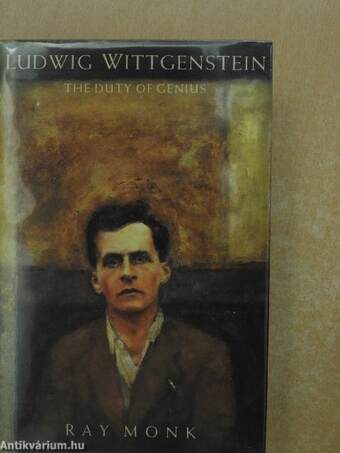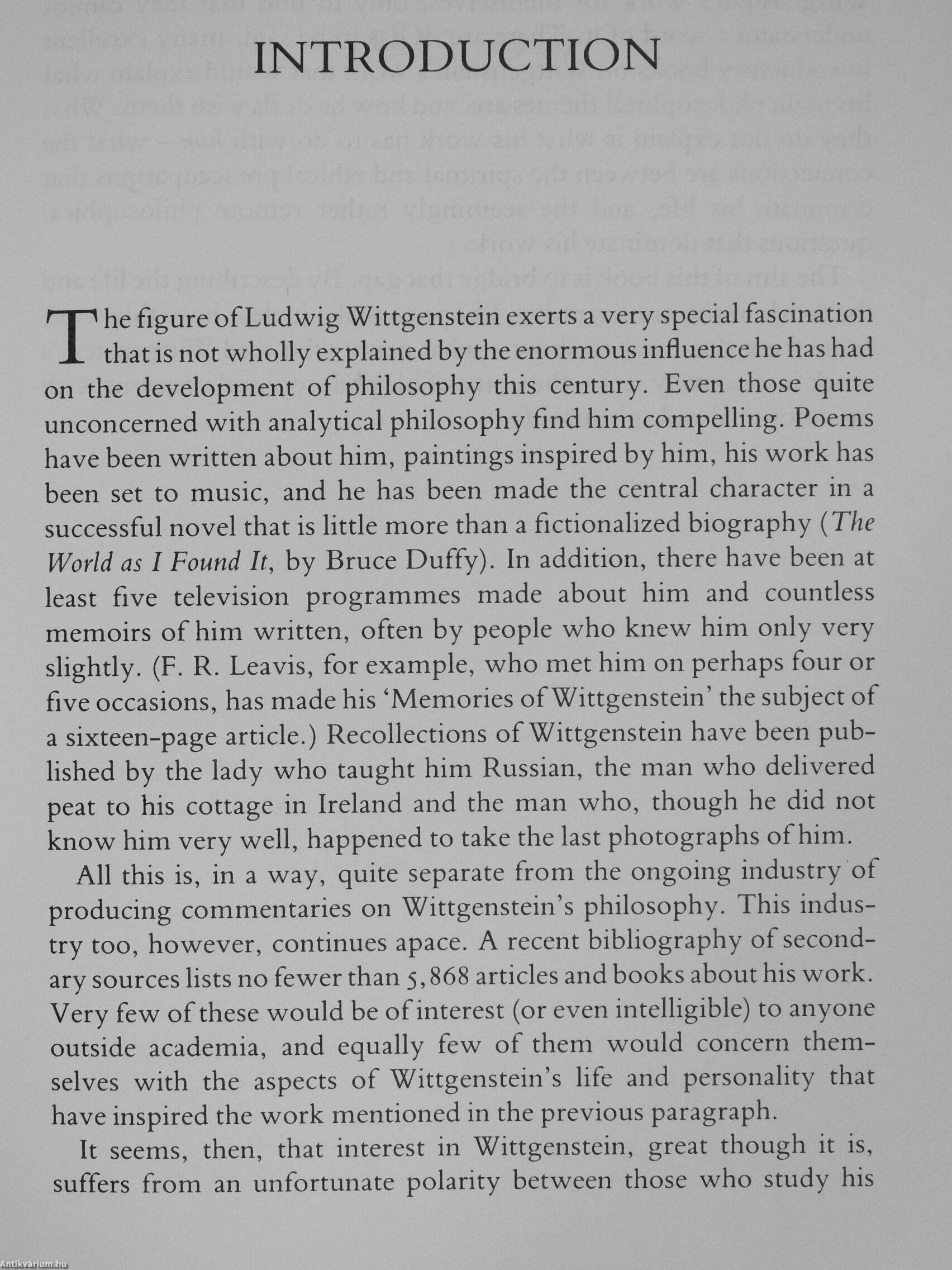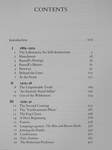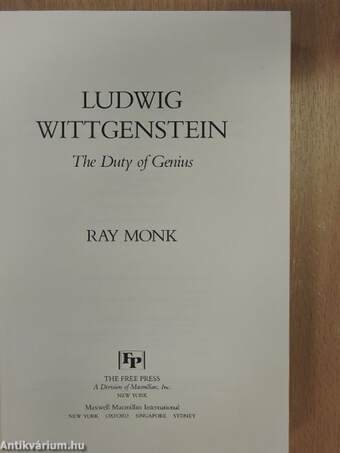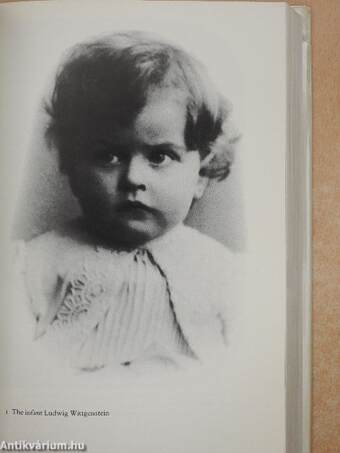1.059.657
kiadvánnyal nyújtjuk Magyarország legnagyobb antikvár könyv-kínálatát

VISSZA
A TETEJÉRE
JAVASLATOKÉszre-
vételek
Ludwig Wittgenstein - The Duty of Genius
| Kiadó: | The Free Press-Maxwell Macmillan International |
|---|---|
| Kiadás helye: | New York |
| Kiadás éve: | |
| Kötés típusa: | Ragasztott kemény kötés |
| Oldalszám: | 654 oldal |
| Sorozatcím: | |
| Kötetszám: | |
| Nyelv: | Angol |
| Méret: | 24 cm x 16 cm |
| ISBN: | 0-02-921670-2 |
| Megjegyzés: | Fekete-fehér fotókat tartalmaz. |
naponta értesítjük a beérkező friss
kiadványokról
naponta értesítjük a beérkező friss
kiadványokról
Előszó
TovábbFülszöveg
Ludwig Wittgenstein was one of the most influential and yet elusive personalities in the history of modern philosophy Ray Monk's compelling portrait now offers us a unique understanding of the man's life and work.
Born into one of the wealthiest and most cultivated families of turn-of-the-century Vienna, Wittgenstein was torn by an intractable conflict between his rigorously logical mind and his impulsive, obsessional nature. The great suffering he witnessed during World War I convinced Wittgenstein that personal hardship and an absence of worldly distraction would lend meaning and focus to his life, and upon inheriting an immense family fortune from his father, he chose to give it all away
Wittgenstein was possessed of one of the most acute philosophical minds of the age, yet he never ceased to doubt his philosophical achievements. He initially studied engineering and architecture, for a brief time contemplated a career in medicine, later decided to be a rural elementary... Tovább
Fülszöveg
Ludwig Wittgenstein was one of the most influential and yet elusive personalities in the history of modern philosophy Ray Monk's compelling portrait now offers us a unique understanding of the man's life and work.
Born into one of the wealthiest and most cultivated families of turn-of-the-century Vienna, Wittgenstein was torn by an intractable conflict between his rigorously logical mind and his impulsive, obsessional nature. The great suffering he witnessed during World War I convinced Wittgenstein that personal hardship and an absence of worldly distraction would lend meaning and focus to his life, and upon inheriting an immense family fortune from his father, he chose to give it all away
Wittgenstein was possessed of one of the most acute philosophical minds of the age, yet he never ceased to doubt his philosophical achievements. He initially studied engineering and architecture, for a brief time contemplated a career in medicine, later decided to be a rural elementary schoolteacher and, during the war, a hospital porter. Wittgenstein fought his calling to philosophy until he was forced to acknowledge his duty to his inescapable mental powers.
A reluctant Cambridge don, Wittgenstein also believed firmly that a professor could not be an authentic philosopher. Although he kept returning to the university setting, he saw himself surrounded there by people who failed to understand him, and always believed he accomplished his best philosophical work elsewhere. Savagely critical of his colleagues and students and ruthlessly honest, he was attracted, in friendship and in love, to gende, intelligent younger men, yet he was so troubled by his own sensuality that these attachments existed most fully in his imagination.
(Continued on backflap)
0Continuedfrom front flap)
For the first time, Wittgenstein is seen in the light of interviews with colleagues and friends who have never before discussed their friendship with the philosopher. Monk is also the first biographer to obtain permission from the executors to quote extensively from many of Wittgenstein's previously unpublished letters and writings.
A richly textured biography of one of the foremost thinkers of our century, Ludwig Wittgenstein reveals the connection between the private life of a tortured man who never fully came to terms with his gifts, and the genius who in the epoch-making works Tractatus-Logico Philosophicus and Philosophical Investigations radically redirected philosophical thought in our time. Vissza
Témakörök
- Filozófia > Témaköre szerint > Életrajz
- Életrajz > Filozófusok
- Idegennyelv > Idegennyelvű könyvek > Angol > Filozófia > Témaköre szerint > Életrajz
- Idegennyelv > Idegennyelvű könyvek > Angol > Életrajz > Filozófusok
- Filozófia > Témaköre szerint > Filozófiatörténet > Irányzatok
- Idegennyelv > Idegennyelvű könyvek > Angol > Filozófia > Témaköre szerint > Filozófiatörténet > Irányzatok
Ray Monk
Ray Monk műveinek az Antikvarium.hu-n kapható vagy előjegyezhető listáját itt tekintheti meg: Ray Monk könyvek, művekMegvásárolható példányok
Nincs megvásárolható példány
A könyv összes megrendelhető példánya elfogyott. Ha kívánja, előjegyezheti a könyvet, és amint a könyv egy újabb példánya elérhető lesz, értesítjük.



